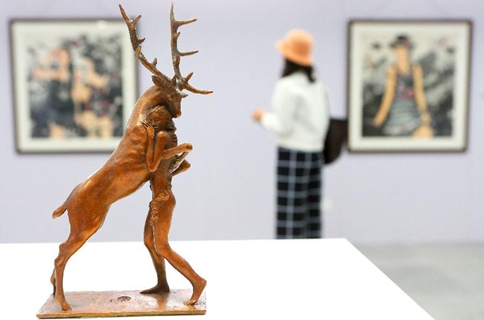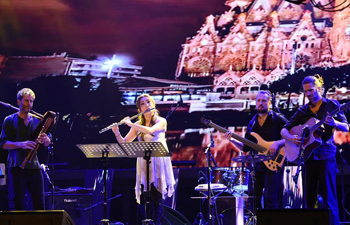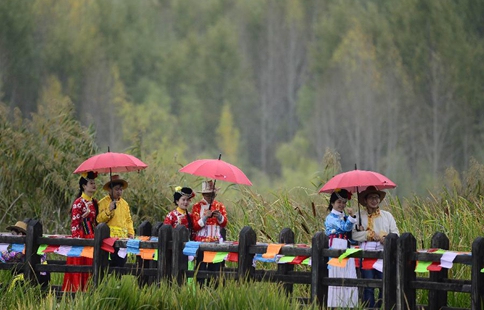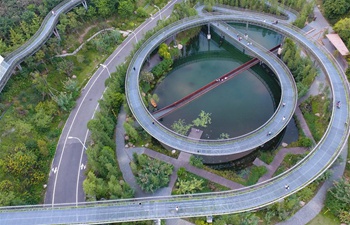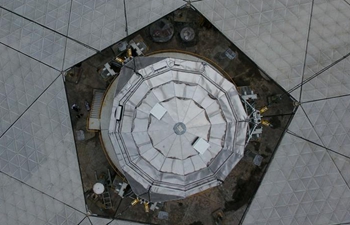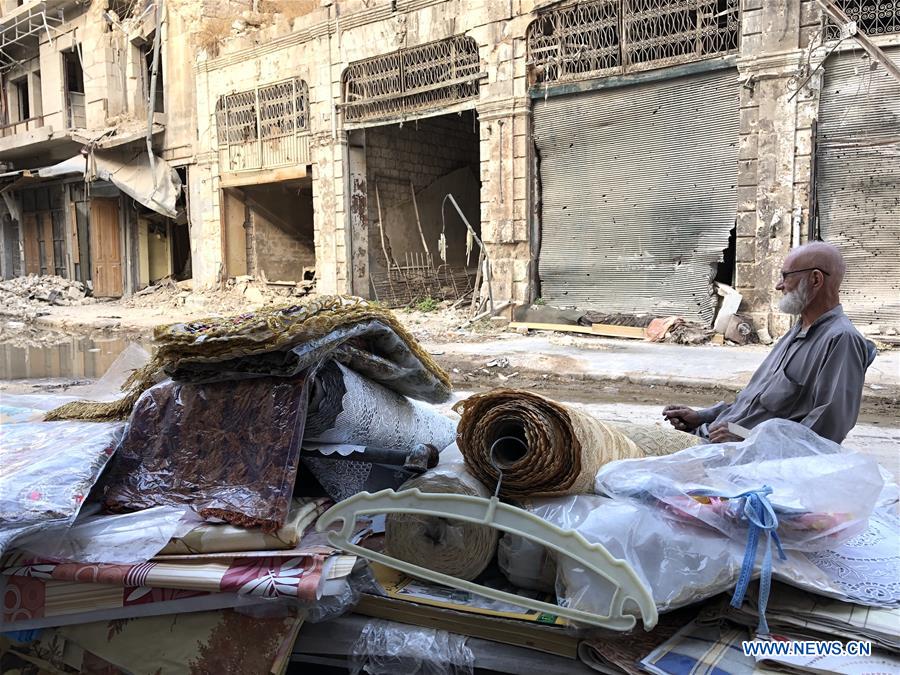
Abu Subhi sits in front of his shop in Aleppo, Syria, on Oct. 12, 2017. In the ruins of the world's most historic souks, 62-year-old Abu Subhi runs a very small shop in Khan al-Harir street in old Aleppo city, surrounded by devastation of the war. His small shop, in which he sells table runners and table cloths, is the only sign of life in the centuries-old area. (Xinhua/Hummam Sheikh Ali)
By Hummam Sheikh Ali
ALEPPO, Syria, Oct. 14 (Xinhua) -- In the ruins of the world's most historic souks, 62-year-old Abu Subhi was arranging his goods in a very small shop in Khan al-Harir street in old Aleppo city, surrounded by devastation of the war.
Wearing a grey galabiyah over a shabby pair of black shoes, the man looked much older than his real age, with a face swept by wrinkles of weariness and trimmed white mustache and thick beard.
His small shop, in which he sells table runners and table cloths, is the only sign of life in the centuries-old area.
He wanted his existence to remind and encourage people to return and rebuild their homeland after it was destroyed in the battles between the rebels and the Syrian army.
"I came to this area in 1973, when it was bustling with life and business. Here is the Khan al-Harir street. Nearby was the Civil Status department and a bank, which made the area a stomping ground for people day and night," he told Xinhua.
The man said he was deeply rooted in the area. Something stronger than his business, maybe his soul, has attached him to the old quarter of Aleppo.
When the war raged, he had no choice but to leave, hoping that one day he could return. He did.
He fled to the city of Bab in Aleppo's countryside, where the war followed. He fled again, this time to his daughter in the Maysaloun area in Aleppo.
"When this place was liberated by the army, I immediately returned," he said.
But the war has wrecked historic souks of 15 km in the old quarter of Aleppo, like a rubber erasing the best chapter of a historic book.
The old man, also a father of four, could not afford to find his business of a lifetime had fallen to pieces after he came back.
"When I first came after the liberation, I found my house completely destroyed and my goods, worth 150 million Syrian pounds, were gone as well. I also found my shop destroyed and my heart broke from the inside, but I couldn't do anything about it," he recounted.
For residents of the old Aleppo who had spent their entire life here, the ruins of the buildings represent their bleeding souls that they can never run away from.
"I was raised in this souk and there is no place else I would rather be. I cannot sell my shop because this souk is all I have ever known," Abu Subhi said, sitting on a plastic chair contemplating the scenes of destruction around him.
The war uprooted those people from where they belong. The liberation of the eastern Aleppo, including the old city, has since revived hope and pushed those like Abu Subhi to return to their homes.
"When I returned after the war was over, I started repairing my shop and thank God I am here. I am waiting for people to reopen their shops because the souk would then be alive again. If they come back, the souk will be back in business again," he said.
Like the very few shop owners who returned to the sprawling marketplace in old Aleppo, the man knew clearly that his business would never flourish like it used to before the war, but he wanted more than just business.
He wanted to be a sign of life in a lifeless place, to remind people that destruction is everywhere but hope still remains.
"I come here every day, open my small shop and arrange my goods. I make tea on a heater that works on firewood, I sit and drink tea," he said.
The revenues are not sufficient to make a living. The man lives off his savings when he was a rich merchant.
"I may not sell anything for two straight days, and sometimes I would sell one piece or two, but I am not here to sell things, I am here so that people would know that there is a life here and that the city would be alive again one day," he said.
Abu Subhi also hoped that the government could speed up the reconstruction of the area to attract more visitors.
Some people passed by as they greet him warmly.
"You still here," most of them would ask with smile on their faces.
"Yes, come over for a cup of tea," that was his usual answer. Then he would move next door to a completely destroyed shop.
He would make tea for himself and the passersby he invited in, before sunset when he would close his shop as the daylight faded.




